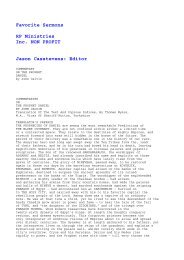Lamentations - The Sermon Depository
Lamentations - The Sermon Depository
Lamentations - The Sermon Depository
You also want an ePaper? Increase the reach of your titles
YUMPU automatically turns print PDFs into web optimized ePapers that Google loves.
ut with whom he had made a perpetual covenant, should thus be forsaken<br />
by him. For though men were a hundred times perfidious, yet God never<br />
changes, but remains unchangeable in his faithfulness; and we know that<br />
his covenant was not made to depend on the merits of men. Whatsoever,<br />
then, the people might be, yet it behooved God to continue in his purpose,<br />
and not to annul the promise made to Abraham. Now, when Jerusalem was<br />
reduced to desolation, there was as it were all abolition of God’s covenant.<br />
<strong>The</strong>re is, then, no wonder that the Prophet here exclaims, as on account of<br />
some prodigy, How can it be that God hath clouded or darkened, etc.<br />
We must, however, observe at the same time, that the Prophet did not<br />
mean here to invalidate the fidelity or constancy of God, but thus to rouse<br />
the attention of his own nation, who had become torpid in their sloth; for<br />
though they were pressed down under a load of evils, yet they had become<br />
hardened in their perverseness. But it was impossible that any one should<br />
really call on God, except he was humbled in mind, and brought the<br />
sacrifice of which we have spoken, even a humble and contrite spirit.<br />
(Psalm 51:19.) It was, then, the Prophet’s object to soften the<br />
hardness which he knew prevailed in almost the whole people. This was<br />
the reason why he exclaimed, in a kind of astonishment, How has God<br />
clouded, etc. F26<br />
Some render the words, “How has God raised up,” etc., which may be<br />
allowed, provided it be not taken in a good sense, for it is said, in his<br />
wrath; but in this case the words to raise up and to cast down ought to be<br />
read conjointly; for when one wishes to break in pieces an earthen vessel,<br />
he not only casts it on the ground, but he raises it up, that it may be<br />
thrown down with greater force. We may, then, take this meaning, that<br />
God, in order that he might with greater violence break in pieces his<br />
people, had raised them up, not to honor them, but in order to dash them<br />
more violently on the ground. However, as this sense seems perhaps too<br />
refined, I am content with the first explanation, that God had clouded the<br />
daughter of Zion in his wrath; and then follows an explanation, that he had<br />
cast her from heaven to the earth. So then God covered with darkness his<br />
people, when he drew them down from the high dignity which they had<br />
for a time enjoyed. He had, then, cast on the earth all the glory of Israel,<br />
and remembered not his footstool.<br />
<strong>The</strong> Prophet seems here indirectly to contend with God, because he had<br />
not spared his own sanctuary; for God, as it has been just stated, had<br />
chosen Mount Sion for himself, where he designed to be prayed to,<br />
because he had placed there the memorial of his name. As, then, he had not<br />
spared his own sanctuary, it did not appear consistent with his constancy,<br />
and he also seemed thus to have disregarded his own glory. But the design<br />
of the Prophet is rather to shew to the people how much God’s wrath had<br />
been kindled, when he spared not even his own sanctuary. For he takes<br />
this principle as granted, that God is never without reason angry, and<br />
never exceeds the due measure of punishment. As, then, God’s wrath was<br />
so great that he destroyed his own Temple, it was a token of dreadful<br />
wrath; and what was the cause but the sins of men? for God, as I have<br />
said, always preserves moderation in his judgments. He, then, could not<br />
have better expressed to the people the heinousness of their sins, than by<br />
laying before them this fact, that God remembered not his footstool.<br />
And the Temple, by a very suitable metaphor, is called the footstool of<br />
God. It is, indeed, called his habitation; for in Scripture the Temple is often<br />
said to be the house of God. It was then the house, the habitation, and the<br />
rest of God. But as men are ever inclined to superstition, in order to raise<br />
up their thoughts above earthly elements, we are reminded, on the other<br />
hand, in Scripture, that the Temple was the footstool of God. So in the<br />
Psalms,<br />
“Adore ye before his footstool,” (Psalm 99:5;)<br />
and again,<br />
“We shall adore in the place where his feet stand.”<br />
(Psalm 132:7.)<br />
We, then, see that the two expressions, apparently different, do yet well



